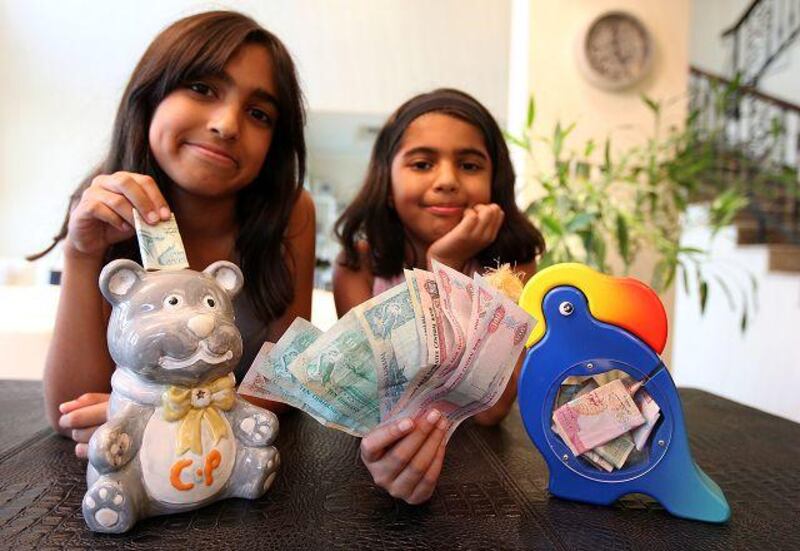Eight-year-old Natalina Popat has a clear savings plan. "When I grow up, I want to buy a flat in Australia," she says with determination. "I love the kangaroos and all the wild animals. I want to set them free." Natalina gets Dh15 a week in pocket money. Until recently, she mostly used it to buy chocolate. "So my dad suggested I save half of my allowance and put it in the bank instead." Her 11-year-old sister, Chantelle, also pledged to buy fewer toys and shoes - she recently bought a pair of silver party shoes with her pocket money - and save for a laptop.
So two weeks ago, their father, 43-year-old Nish Popat, himself a banker at ING, opened an account for them. "I had noticed they were spending all their pocket money and saving none. They were quickly turning into spoiled brats. They need to know the value of money. They had already realised that spending money is a lot easier than saving," he said, chuckling. When Mr Popat looked for a bank with special offers for kids he came up dry. "It is really quite disappointing. Here, kids seem to get pocket money with the aim of spending it all. The banks don't seem to encourage children to save at all."
In the end, Mr Popat opened savings accounts in the girls' names at HSBC, which only Mr Popat and his wife can access. But he was disappointed to return home empty-handed: The bank did not give the children any books or toy vouchers or colourful piggy banks that are so common elsewhere as incentives to get children to get into the banking and saving habit. So far, few banks in the UAE cater to children. But that is changing as the institutions realise the potential of young customers, as well as their responsibility to educate them, particularly in a country that became rich almost overnight.
"Thirty years ago there was not much money to go around. Now the UAE is a wealthy country," said Ahmed al Naqbi, a senior manager in the consumer banking division at the National Bank of Abu Dhabi (NBAD). "When wealth is acquired and relatively new, people might not necessarily know how to manage that. It needs to be learnt continually, and bankers are seeing that it is getting better." NBAD offers its "First Step Account," special student credit and debit cards, and is now working on a product package geared towards 14- to 18-year-olds.
Commercial Bank of Dubai (CBD) has three savings plans geared specifically to children. Now the bank, which has a high percentage of Emirati clients, is in the final stages of setting up an interactive website to educate children about everything from interest to stock exchanges. "All children are into Nintendo these days, and we are using that to help them understand the world of money," said Frans-Jan Burkens, head of consumer banking at CBD.
Come summer, children will be able to log on to the CBD site to buy their favourite toys on make-believe shopping sprees with make-believe interest they earn from make-believe deposits. The games will be geared to children seven years and older, and all participants will be given virtual money that can earn interest. Younger kids may get piggy banks, and also virtual shopping carts with which to buy their favourite toys.
The site will also teach older children about investing. "We need to address children. The quicker we get some rapport with them, like through this game, the easier they grow into banking naturally, rather than with a bang at 18 or 21," says Mr Burkens. "We want to give the youngsters banking experience." NBAD, meanwhile, uses a comic book to educate children who sign up for its First Step Account about money and the importance of saving. It tells the story of Mrs Bee, who is always busy making extra honey for rainy days, and Mr Buzzy, who thinks only of today.
"Honey is like money," the story concludes. "You have to save to buy your red car with remote control or your latest virtual reality game or your doll house." All of this is new to the UAE. Until recently, banks tended to address parents wanting to set aside money for their children, most often for their education. CBD, for example, started to offer its basic child savings plan six years ago. The response to that scheme was strong, so officials introduced two additional plans last year.
For its latest innovation, a "high-end" programme called "Aldana Pearl Mustakbali," parents set aside Dh5,000 for their child every month, which is invested in funds of funds across global markets. The plan mimics a life savings plan, and gradually shifts the portfolios towards safer products as the child approaches university age. "Although the plans benefit the child in the end, they are geared to the parents," says Mr Burkens.
Mashreqbank, another Dubai-based institution, is in the last stages of developing specific products geared for children. The bank, which did not want to provide more information at this time, says its launch is a few months away. Differences in the legal code, family traditions and population make-up are some of the reasons why children's banking has been slow to take off in the UAE. In Germany, for example, school-age kids can carry their piggy banks to their local bank branch on World Savings Day, put their change on the counter and receive a receipt.
By contrast, children in the UAE have to be 18 to conduct their own banking transactions - and that includes things as simple as putting a few dirhams into their accounts. "Here you need a guardian to sign for everything," says Mr Burkens. "You must be 21 to take out a loan. Meanwhile, kids in Europe feel like they are the owners: 'it is my account, I can put Dh50 into it whenever I feel like it.'"
In addition, Emirati families tend to bank with local banks, and a high percentage of expatriates are young and aspiring professionals without children. Finally, many middle-class expats, who come here with family, tend to send their university-age children to be educated elsewhere. "We might have an ambition to service children, but it doesn't make sense from either an economical or educational viewpoint. There is just not enough demand, and we don't have enough branches," says Rana Zeeshan Saleem, head of consumer banking for Barclays in the UAE and GCC.
"I look at the UAE population profile every week," says Mr Saleem. "You may have hundreds of thousands of expatriate kids below grade 5, but above the age of 10 that number rapidly goes down, and you will have a majority of locals." Meanwhile, Mr Saleem says he taps some 14- to 22-year-olds as future customers. "Many of them go abroad. We issue lots of supplementary debit or credit cards and make lots of money transfers." However, the parent remains the primary account holder.
NBAD, which also offers student debit and credit cards at preferential rates, is in the final stages of developing a special product for those aged 14 to 18. "We have a gap in that age group. It is very important for us," says May Ibrahim, who is an assistant marketing and product development manager at the bank. "But it is also very tricky - kids that age don't want to save." Instead of teaching them to save, the bank is developing a special prepaid card that will offer promotions from different retail outlets. "We plan to upgrade them to standard cards later on. Our main goal is to establish a long-term relationship."
With some patience and experience, Natalina and Chantelle may soon become truly banking savvy. Then it may just be a matter of time until the girls beg their father to switch to a bank that pays more interest - or offers piggy banks. uharnischfeger@thenational.ae






